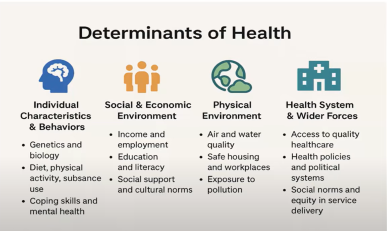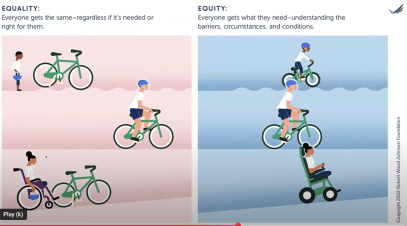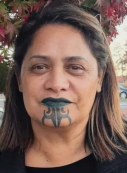
Watch now: Inequities and the Determinants of Health webishop
HPF’s online workshop (webishop) Inequities and the Determinants of Health is now available to view on our YouTube channel.
Presenter Megan Tunks, and guest speaker Mapihi Raharuhi, shared some valuable insights from their extensive backgrounds in health promotion and public health with over 50 participants who attended the webishop. (See more details about speakers below)
They discussed the determinants of health, including cultural, physical environment, commercial, political and digital  determinants, as well as inequity/equity and ‘systems thinking’ and its use in health promotion.
determinants, as well as inequity/equity and ‘systems thinking’ and its use in health promotion.
Megan started the conversation around the determinants of health by emphasising the importance of community.
“We're all part of a community. The community is part of a system. We all make up parts of that system. But first and foremost, health starts in our homes … that's where we start those connections with whanau … with your hapu, with your Hapuri (community), with your iwi … that has an influence on our health behaviour.”
She pointed out that culture was a determinant and enabler of wellbeing, and it was increasingly conceptualized that indigeneity was also a determinant of health.
She also touched on the rising visibility of the digital determinants of health in this age of technology, as well as the increasing impact of the commercial determinants of health in the current political environment.
The next part of the webishop focused on the difference between the terms equality and equity.
It was important, said Megan, to recognise this. “I think at times health inequity and health inequality may be used side by side.
 “There is a difference between health status between two groups … one is health inequity, which is unjust, and can be mitigated … it shouldn't be happening … it's around what is needed to be able to reduce those disparities between the groups.
“There is a difference between health status between two groups … one is health inequity, which is unjust, and can be mitigated … it shouldn't be happening … it's around what is needed to be able to reduce those disparities between the groups.
“What are the societal and structural, social, economic factors? What are some of the policies, political determinants that can be implemented to enable that disparity to be reduced.”
To highlight this Megan used the example of diabetes, which is more prevalent among Maori and Pacific Islanders.
Mapihi rounded off the webishop by looking at ‘systems thinking’,using as an example the ‘Healthy Families Rotorua’ initiative.
“Systems thinking requires us to be asking questions all the time. You work with your community, influencing leadership, influencing sectors. With systems thinking and innovation you don't prescribe the end, but leave it open-ended.
“Today you're getting a very quick snapshot of a very disciplined approach to systems and the whole-of-community approach to systems thinking.
“I'm trying to give you some little snippets to Healthy Families Rotorua – a very quick snapshot of a very, disciplined, area of work.”
To round off the webishop participants broke out into activity groups to address an important health issue/topic, using the systems thinking toolkit.
Watch on YouTube
(Please like and subscribe)
About the presenter:
Megan Tunks, (Te Whānau-a-Apanui, Whakatōhea) is an experienced Public Health Thought Leader who has held a range  of leadership roles within Health Promotion, and Public Health, including former CEO at Toi Tangata. More recently, Megan was the Chief Advisor Health Promotion in the National Public Health Service in 2023 and 2024.
of leadership roles within Health Promotion, and Public Health, including former CEO at Toi Tangata. More recently, Megan was the Chief Advisor Health Promotion in the National Public Health Service in 2023 and 2024.
She holds a number of educational qualifications including a Masters of Applied Practice (Technological Futures) from Unitec & Tech Futures Lab, a Masters of Philosophy (Māori Health Education) with First Class Honours, a Diploma in Secondary Education and a Bachelor of Arts (Māori Studies).
Guest speaker:
Mapihi Raharuhi (Ngāti Pikiao, Ngāti Mākino, Ngāti Kea, Ngāti Tuara, Ngāti Waiora) who is experienced in system  thinking, Māori & Community development, to share her insights. Mapihi was the former Director of Equity and Outcomes at Lakes DHB and the former Manager of Healthy Families Rotorua. Mapihi is a distinguished leader, academic, and advocate whose work reflects an unwavering commitment to advancing Māori health and wellbeing through cultural and genealogical frameworks.
thinking, Māori & Community development, to share her insights. Mapihi was the former Director of Equity and Outcomes at Lakes DHB and the former Manager of Healthy Families Rotorua. Mapihi is a distinguished leader, academic, and advocate whose work reflects an unwavering commitment to advancing Māori health and wellbeing through cultural and genealogical frameworks.
In 2022, she earned a Masters of Māori and Indigenous Leadership from the University of Canterbury and is now pursuing a PhD at Auckland University of Technology. Her doctoral research explores how Te Arawa whakapapa can serve as a powerful tool to achieve equity for Māori accessing health services.